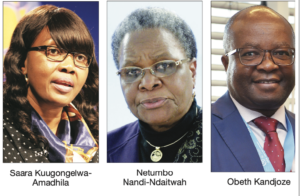[ad_1]
MEATCO welcomes the emergence of private sector players into the meat processing space because healthy competition is good for the industry.
This was said by Meatco chief executive officer Mwilima Mosokobanji at a media briefing on Friday when he said the country had enough cattle for all processors and there was a huge unfulfilled demand on the export market.
The latest entrant, Savanna Beef Processors Ltd, plans to raise N$300 million from institutional investors and loan finance to establish a new export beef-processing facility in the country.
Musokobanji said the 2,5 million national herd is big enough for all players as Meatco only needs to slaughter 60 000 cattle a year to break even.
He said new entrants would help stabilise the industry if they can help prevent the export of between 220 000 and 230 000 weaners on the hoof to South Africa.
“At the moment we are not meeting the demands of our market. There is a 1,5 billion market in China alone and new entrants are welcome,” Musokobanji told the media.
He said this is not the first time new entrants are coming into the environment, as in the past there was Witvlei abattoir and another operator at Mariental.
“It is good to have a private sector entity and a commercial public enterprise with a public policy objective so that where there is a market failure, Meatco would be able to intervene.
“If Meatco was a private entity, government would not have instructed the company to go into the northern communal areas and build markets there and deal with market failure,” he said.
Musokobanji said the agricultural sector was at crossroads with so many opportunities facing the industry and Meatco had a tough two years after the 2019 drought.
The company focused on three strategic areas: debt reduction, market development in the NCAs, and having a lean agile organisation for survival and to stabilise the industry.
“As Meatco, we were hard hit in 2019-20 as we slaughtered 116 000 cattle because farmers had been advised to destock in the face of the drought or their cattle would die.
“We had to pay competitive prices to the farmers and this means we were able to sustain primary production. When the farmers are able to produce, Meatco is able to get good quality cattle to the abattoir where the meat can be processed for different markets,’ he said.
He said the 116 000 slaughtered in 2019 had realised N$1,7 billion and of this, N$1,1 billion was paid to farmers so that they are able to drive primary production.
“The two years thereafter were difficult for Meatco because the country had lost 50% of the national herd to drought in 2019-20 season and now farmers were restocking.”
He said the Windhoek abattoir has a capacity of 120 000 cattle and a break-even figure of 60 000 for export but in the previous year, the facility slaughtered only 36 000 cattle.
“In the year under review, we only slaughtered 35 000 cattle due to the drought,” he said, adding that they had designed strategies for the company to survive.
“Year-to-date we have slaughtered 28 000 cattle, but last year this time we had slaughtered 17 000 cattle as farmers have been restocking for the past two years and cattle numbers are starting to look good,” he said, adding that as long as you have a low throughput, it affects your bottom line.
Musokobanji said the sources of competitive advantage in the meat industry were that Meatco had paid its historical debts of N$94 million from Bank Windhoek and N$520 million from First National Bank that were taken around 2011.
This means Meatco’s assets including the abattoir, feedlots, stock and the head office, that had been attached in lieu of the loans have been released.
“However, an amount of about N$400 million is still outstanding to the Development Bank of Namibia (DBN),” he said.
Musokobanji said this was the first year Meatco had operated without bank financial backing as they recapitalised their own resources.
He, however, said the government had given Meatco a capital injection of N$200 million through DBN.
He said the cordon fence had been an enabler in that Namibia continued to export to lucrative markets because south of the fence is a foot-and-mouth free zone.
“Botswana and South Africa could not export to Europe because of FMD outbreaks.”
However, the NCAs which have 64% of the national herd also benefited from the intra-Africa trade with new markets in Ghana, Tanzania, Angola and the Democratic Republic of Congo, and N$12 million was paid to the farmers, Mushokobanji said.
“Angola has been importing US$9 billion worth of beef from Europe when there is plenty next door,” he said.
Mushkobanji said because of the commodity-based trade, beef from the NCAs was now being consumed south of the cordon fence in Windhoek, and at Swakopmund and Walvis Bay.
Email: [email protected]
[ad_2]
Source link




